“Art” is one of those words that you sort of assume is international. And, if you’re learning French, Spanish or Italian, you’re in luck – art, arte and arte, respectively. Not so in German. No, the German word for “art” is “Kunst”, which, let’s face it, is far more fun to say. KUNST!
Now, I can’t claim to be an art expert in any way, shape or form, but I’m always looking for ways to broaden my horizons and, of course, improve my German. So, when I heard about a “Kunst & Deutsch” afternoon being run by a company called Kunstkomplizen (Accomplices in Art), I decided to sign up.
We were to meet outside the old “Der Tagesspiegel” building, in the up-and-coming gallery district of Potsdamer Straße, at the very Linda-friendly time of 3pm. As I’m still out-Germanning the Germans when it comes to punctuality, I was the first to arrive at around 2.50. We would be visiting two galleries that day –Jarmuschek + Partner and the Maerz Galerie.
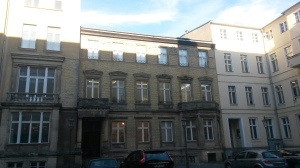
I’m always a bit nervous when it comes to this kind of stuff. I’m afraid that I will be the worst at German, that I will say or do something ridiculous or, horror or horrors, be the weird, silent one in the corner. But, when Hedda, our guide for the day, showed up before any of the rest of the group, I had no choice but to stop mooching around the car park like a weirdo and, instead, engage in lovely, German small talk. Poor Hedda…
We chatted a bit about our work, what had brought us to Berlin, and my amazing German skills. (I’m kidding about the last one.) By the time the rest of the group showed up (late), I was totally at ease. Hedda asked us if we’d mind if she used the “du” (informal) form of address, none of us had any problems with that and all was rosy in the world of Kunst & Deutsch.
In the end, there were five of us in the group. Me, a French artist, a French student of prehistoric archaeology (female, unfortunately, so no Indiana Jones-style eyelash-batting opportunities), a programmer from England and an American yoga therapist. Apparently, that is a real job. And, of course, our lovely guide, Hedda, art historian and German teacher.
After a round of introductions, it seemed that we were all roughly the same level, apart from the American, who was an absolute beginner. It was time to enter the lion pit gallery.
First up was the Maerz Galerie, featuring a series of installations by Thomas Sommer called “Schluss mit lustig”. Seemingly, Sommer’s “three-dimensional collages are a series of irritating trials and offer everything that doesn’t want to be definite”, but none of us had a clue how to say any of that in German so we walked around together, saying what we liked, didn’t like and why.
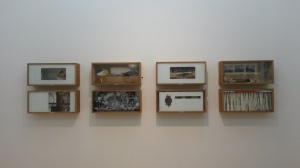
The great thing about a tour like this is that everyone can have an opinion – there’s no right or wrong when it comes to interpreting art. Plus, everyone is so conscious of their own German level that there’s no judgement or laughter at anyone else’s expense. Naturally, I caused a couple of outbreaks of laughter, but I know that was because of my witty genius rather than my shoddy German…
Hedda was friendly, relaxed, patient, and fantastic at steering the conversations we were having, making sure that everyone participated a little. She also handed out sheets with useful vocabulary and grammar explanations as we went along.
Hedda: Schluss means “end” so how would you explain the title of the exhibition?
Me: (little brain working overtime – OK, so “end with fun” would mean the fun’s over, which (maybe?) means roughly the same as… YES! It was time to bust out one of my beloved German sausage expressions!) Um, jetzt geht’s um die Wurst?
Hedda looked surprised and, I like to think, a little impressed.
Hedda: Why, yes! Does everyone understand what Linda just said?
Blank looks all round. Linda glows.
Hedda: Why don’t you explain it to them, Linda?
Crap. Linda’s glow dims.
Me: Well, it translates as (doing annoying quotation marks with my fingers and hating myself simultaneously) “Now it gets about the sausage”, which means that it’s time to get serious. The fun’s over.
I don’t know if they understood me or not, but I was happy. We moved into the next gallery. At the end of the tour, we each had to pick a piece and describe it, using our newly-learned, arty German. I was the first to volunteer which, trust me, is very unlike me but there was method in my madness. I chose this one…
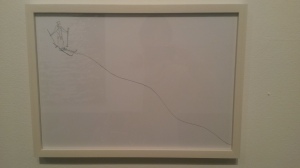
The others got stuck with trying to describe this…
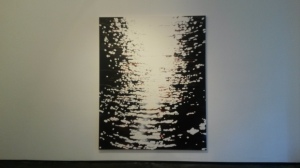
And this…
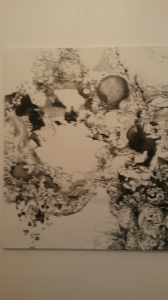
When the tour ended, I practically skipped out of the gallery. I had spoken, and understood, German for close to two and a half hours, and had even managed to slip a porky expression into a very high-brow conversation. The whole afternoon had only cost €20 and I can definitely say that I got more than my money’s worth.
So, I’m sorry to say, Kunstkomplizen, you’ll probably be seeing me again in the near future. Now I’m off to learn some more weird German expressions so that I can blow your minds next time round…
If you want to check out some more porky German expressions, click here:

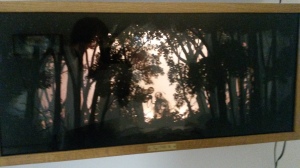
Love this article! (Not only as a Kunstkomplizen-Fan)
LikeLiked by 1 person
Thank you Stefan! I got a lovely email from Hedda the other day 🙂
LikeLike
Art is one of those things that gets funnier the more you try to explain it 🙂 Congrats on the German accomplishments!
LikeLiked by 1 person
Going to a German theatre-improv night this week – that should be fun. And terrifying haha!
LikeLiked by 1 person
Improv is hilarious, and I bet in German it’s going to be better! Even if you can’t understand any of it!
LikeLiked by 1 person
I’m going to be DOING it so hopefully I will understand!!
LikeLiked by 1 person
I hope to God someone is taking a video of this!!!!!!!!
LikeLiked by 1 person
I hope to God they aren’t haha! Should be funny anyway – actually I’m certain it will be funny…
LikeLiked by 1 person
I would pay someone to take a video and distribute it!
LikeLiked by 1 person
I would have to kill you and I don’t want to do that 😉
LikeLiked by 1 person
Mostly because of the hassle of an international assassination attempt.
LikeLiked by 1 person
Hey! I’ve got an idea – why not come to Berlin for a visit!? 😉
LikeLiked by 1 person
Some day! With a bodyguard, though 🙂
LikeLiked by 1 person
Reckon I could take Ryan… 😉
LikeLiked by 1 person
He is a skinny dude…
LikeLiked by 1 person
I can improv him to death 😉
LikeLiked by 1 person
Speaking in German, you just might win! It might scare him away!
LikeLiked by 1 person
NEIN, Ryan – a very short German poem in his honour 🙂
LikeLiked by 1 person
A (German or not- German) theatre-improv funny?
Maybe when hell freezes over …
Even when the actors use drugs the maximum is a kind of pseudo- infantile debility. 👿
LikeLike
I think you misunderstood what it is 🙂
https://www.facebook.com/groups/300182446742508/
LikeLike
I refuse to join facebook. What is it?
A German cooking course? A flash mob? A swinger party? A puppet black theatre?
I’m so innocent …
LikeLiked by 1 person
Philistine 😉
“Einkadung zu German with Theater Games – der ganz andere Deutschkurs!
Nächstes Mal mit dem Thema: Getränke und Restaurant”
LikeLike
All of a sudden I am reminded of the grim Berlin street art and concert posters…so much WHY!!!
LikeLiked by 1 person
So much I LOVE IT 🙂
LikeLike
I must say, it annoys me slightly the way German teachers always want to use the ‘Du’ form. When are the poor students supposed to get any practice using ‘Sie’? But I suppose it’s just me that has this problem ^^
LikeLiked by 1 person
Ha, well, I do find the ‘du’ form easier, but I guess that’s mainly because I use it so much! I think Berlin in general is pretty casual when it comes to this stuff. Even when I try to start off with ‘Sie’, they instantly tell me ‘NEIN!’ Guess I’ll keep on ‘doin’ the du’!
LikeLike
It’s not “casual”, its curry favour with the students. I don’t like this; especially there are greater differences in the structure of age or habitus. 👿
An acceptable agreement is to “siezen” with forenames. 😀
LikeLike
I don’t think she was trying to curry favour. We were all around the same age, it was a casual setting, plus she didn’t have to mess around learning how to pronounce our ‘weird’ foreign surnames. Made sense to me! And I think Berlin is pretty well known for being less uptight about du/Sie, right or wrong.
LikeLike
Just for interest, does anyone actually do this, siezen with first names, I mean? I’ve never observed any such thing “in the wild”, it seems to exclusively happen in the world of US films/series etc dubbed into German.
Maybe it happens in northern Germany…? Down south, no chance.
LikeLiked by 1 person
I’m also from the south.
Maybe you haven’t the opportunity to experience this special polite form. But yes, this form slowly decreases in favour of “Duzen”.
LikeLiked by 1 person
I don’t think it’s to curry favour, I think it’s just that the teachers feel more comfortable that way 🙂 They don’t really think about how much it disadvantages the students when they go out into the real world not having had any practice using ‘Sie’.
If the problem is that people’s surnames are difficult to pronounce, then I agree that using Sie plus first name is a reasonable compromise 🙂 Even if this form of address is not typical outside of a classroom situation, at least the students are getting a chance to practice the grammar.
LikeLiked by 1 person
Surely there are still some situations where you need to use ‘Sie’, such as when speaking to Beamte. Or are you allowed to say ‘Du’ to them as well in Berlin?
I can kind of understand it from the teachers’ point of view: If I were working as an English teacher, I would probably feel a bit strange if my students wanted to address me as ‘sir’ or ‘mister’ or by my last name. On the other hand, I think German teachers underestimate the difficulty of this aspect of the language for someone whose native language only has one word for ‘you’. Getting to the point where you can switch fluently between ‘Du’, ‘Ihr’ and ‘Sie’ as the situation requires, using all the correct verb endings and possessive pronouns, takes some serious practice!
LikeLiked by 1 person
Very true! As for the Beamte, I normally just sit and whimper 😉
LikeLiked by 1 person
This — “be the weird, silent one in the corner” — you will never be 😉
LikeLiked by 2 people
Ha, no, I’m sure people sometimes wish I was though haha! I’m usually the raucous one 😉
LikeLiked by 1 person
Which is why you’re so much fun 🙂
LikeLiked by 1 person
Never a dull moment with me 😉
LikeLiked by 1 person
🍻
LikeLiked by 1 person
That is such a good idea for a tour! Love the worksheets w/specific vocab and everything. It’s so much easier to follow something in German when you know the subject matter beforehand. And points to you on working in a wurst joke!
LikeLiked by 1 person
Never miss an opening haha! Yeah, it was really great – I definitely recommend it! Is there anything like this where you are? Or free meet-ups and stuff like that?
LikeLiked by 1 person
Not that I’ve come across. Tours in German or English sure, but never one specifically for German learners. There are also Stammtisch meetups for various languages, but my antisocial side has never gotten to one of them.
LikeLiked by 1 person
Ha, you should give it a go! Unleash your social side!
LikeLiked by 1 person
Ugh. People. 😉
LikeLiked by 1 person
Hater 😉
LikeLiked by 1 person
Some days. Dogs for the win!
LikeLiked by 1 person
Ha ha! I have another German meet-up this week – I love this stuff 🙂
LikeLiked by 1 person
More power to you, you little social butterfly! Groups are just not my jam. #sociallyawkward
LikeLiked by 1 person
Any excuse to try and work a Wurst expression into a conversation with a new crowd 😉
LikeLike
You are doing so well learning German!
Maybe that prehistoric archaeology student can guide you to another tour where Indiana Jones will be waiting. That would be quite an incentive.
LikeLiked by 1 person
Ha, it would! Very much so! I’m getting there. It’s hard work and time-consuming but it will all be worth it in the end! 🙂
LikeLike
I initially read the first sentence as “art is one of those words that you sort of assume is intentional” and was waiting for a story about accidental art.
Trust you to manage to use “Jetzt geht es um die Wurst” in real life. I don’t think I’ve said that phrase EVER!
LikeLiked by 1 person
Ha ha! I guess I have a natural talent for porky idioms 🙂 It should be used more often – it’s great! Do the Swiss use it at all or is it just a German thing?
Hmm, accidental art – I read something about that today 😉
http://thecreatorsproject.vice.com/blog/bang-on-a-canvas-to-make-art-with-this-sex-paint-kit
Latvians, eh?! 😉
LikeLiked by 1 person
That was on The Big Bang Theory! Except it was a sheet instead of a canvas. Sorry Latvians, TV beat you to it.
I don’t know any Swiss people, but I’m sure they understand the expression.
LikeLiked by 1 person
Ha ha! I love that show 🙂
You don’t know any Swiss people? How long have you been there now?
LikeLike
I’ve met Swiss people but I don’t know anybody well enough to find out what phrases they use. Half of Basel is foreign! Even my neighbours are mostly German and Indian!
LikeLiked by 1 person
Plus we can’t all make friends as easily as you!
LikeLiked by 1 person
From what I’ve heard about Switzerland, I think even I’d struggle 😉
Most of my neighbours are Asian at the moment. And today I heard mainly English and Russian on the streets. Sigh 😉
LikeLike
Sounds super (and like your German is coming along swimingly!)
LikeLiked by 1 person
I’m doing my best 🙂 Have another language workshop tonight – must keep plugging away at it!
LikeLike
Your translation is superb. 🙂
But … €20 for a guided tour in two not so illustrious galleries … 😯
I hope Hedda offers free canapés and Sekt! For €22 you can delight Tosca by Giacomo Puccini in the Deutsche Oper Berlin (on this seats a lorgnette is highly recommended).
Some smart- shitting: “Kunst” comes from “können”, Old English ‘cunnan’ (‘know’) ! Pretty similar 😎
LikeLike
And what German would I learn at the opera? €20 for over 2 hours with a professional teacher is a total snip!
Nice etymology 🙂
LikeLike
In “Tosca” you practise your Italian for your next shopping tour in Milano or dolce far niente in the Toscana. AND you enhance your German AND English because of the German and English surtitles!
http://www.deutscheoperberlin.de/de_DE/calendar/tosca.12677401#
LikeLiked by 1 person
Clearly you don’t know me at all – a shopping trip anywhere would be my worst nightmare.
And I get free opera in my flat every day thanks to my massively inconsiderate, tubby chump of a neighbour so I think I’ll give it a miss 😉
LikeLiked by 2 people
This seems a strong argument. 😆
Maybe you should face this Schreihals with the German law:
http://www.welt.de/finanzen/immobilien/article13801339/Was-tun-wenn-der-Nachbar-zu-laut-singt.html
Enjoy Berlin. This metropolis nowadays is the centre of fine arts in Europe, maybe the world. London, Paris and Ney York may have more luxurious and hideously expensive galleries, but Berlin has the international creative folks.
More smart- shitting: In all the other Nordic countries Kunst is kunst (or konst). 🙄
LikeLiked by 1 person
Yup, I looked it up in a few different languages before writing the post – Swedish, Dutch, Danish, Norwegian… And Latvian has to be different again – māksla 😉
LikeLiked by 1 person
English “art” is a holdover from the French conquerors.
How do you say Kunst/ art in Irish- Celtic Gaelic? ❓
LikeLiked by 1 person
Ealaín – pronounced like ale-een 😉
LikeLiked by 1 person
Thank you.
I like the old Celtic and Germanic tongue. Sounds like Lothlórien and Rohan …
LikeLiked by 1 person
Haha kindred spirit! I detest shopping, unless it’s in a bookstore. Or a cheese shop 🙂
Kunst is a great word even if I find it hard to pronounce the consonants NST. Do they use it the way we use art, as in “the art of conversation”?
LikeLiked by 1 person
I have been reliably informed that they do! Thanks for asking that – you’re adding to my vocabulary 🙂
LikeLiked by 1 person
Preen away bella at your clever German phrases! Did you use “Eierlegendewollmilchsau” by any chance???
LikeLiked by 1 person
No, dammit, still waiting for a chance to bust that one out! It will come though… 😉
LikeLiked by 1 person
Well shucks! I was hoping you would have a brilliant excuse to trot that one out! 🙂
LikeLiked by 1 person
Trot haha – I’ll pardon the pun 😉
I will find one – going to another language evening tonight. Maybe there – although I don’t fancy trying to explain that one in German!!
LikeLiked by 1 person
You caught that, eh?? And would love to hear ya try explaining it. Maybe pull out your blog post with the image??? Could be a show n tell! 😉
LikeLiked by 1 person
Worked it into a conversation yesterday – woop woop! We were walking past a shop and there were Swiss Army Knives in the window – ah, look at that Eierlegendewollmilchsau 🙂
LikeLiked by 1 person
Well, well, well!! Look at you!! I’m proud of ya!! 🙂
LikeLiked by 1 person
It had to happen sooner or later haha!
LikeLike
I’d be into that kind of language lessons, for a good price too!
LikeLiked by 1 person
It was great! I really enjoy German lessons but it’s great to be able to use the language in new settings – and learn words you wouldn’t normally learn! 🙂
LikeLiked by 1 person
And … just how old was this student? “a French prehistoric archaeology student” sounds pretty darned ancient to me!
LikeLiked by 2 people
Heh heh, that’s what I get for waking up at 6 and trying to write a blog post 15 hours later 🙂 But, up at 5 this morning and awake enough to realise that that does sound weird 🙂
LikeLiked by 1 person
This: “doing annoying quotation marks with my fingers and hating myself simultaneously” makes ny life. We’ve all been there, haven’t we?
LikeLiked by 3 people
Glad I’m not the only one haha! It’s also called ‘How not to make friends on a gallery tour’ 🙂
LikeLiked by 1 person
Sure you don’t want to do the antiques one…??
LikeLiked by 1 person
Quite sure 🙂 I’m waiting for the Speed-Sketching Workshop – I’m intrigued 😉
LikeLike